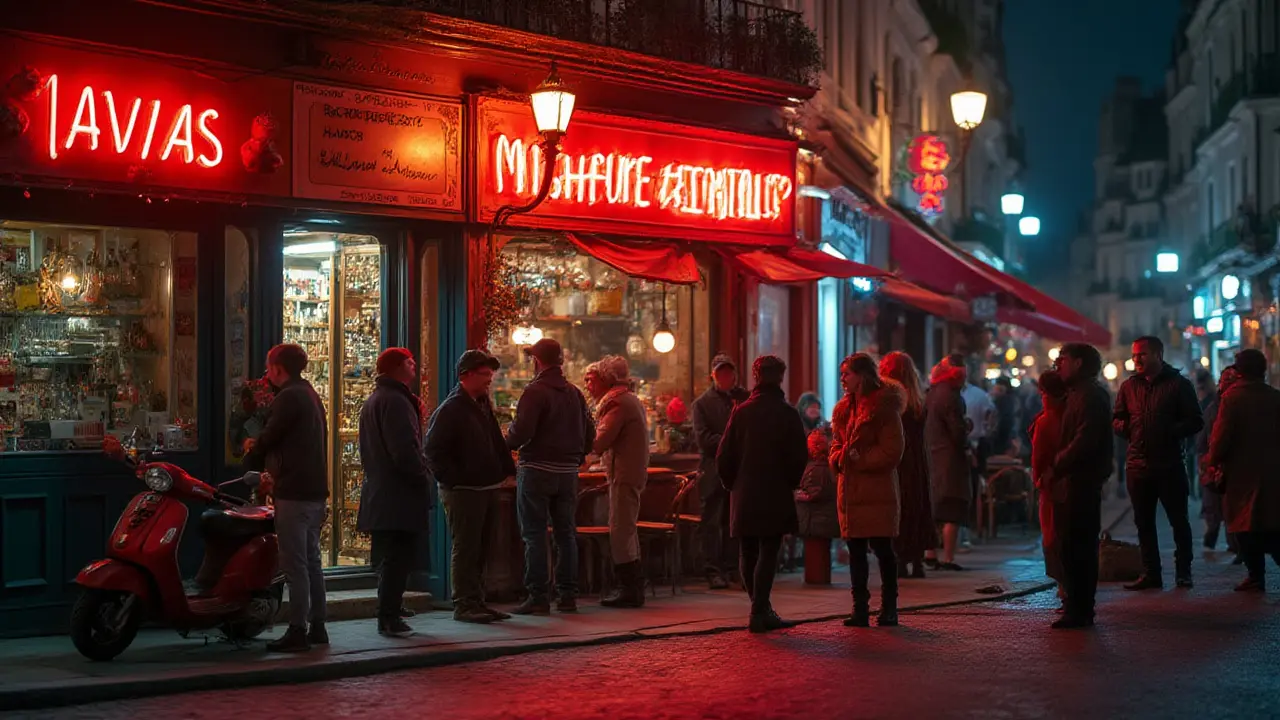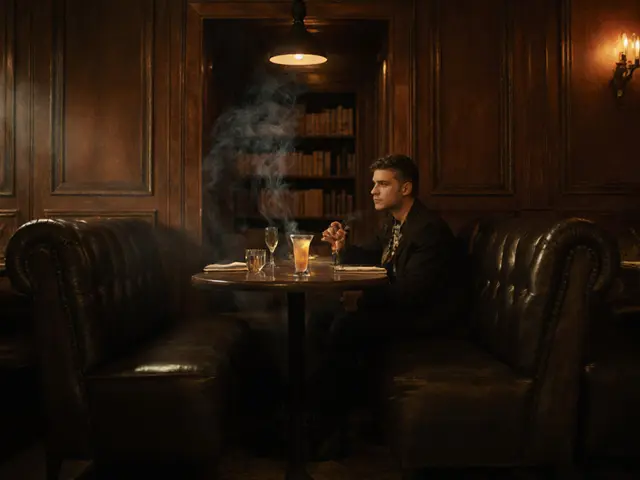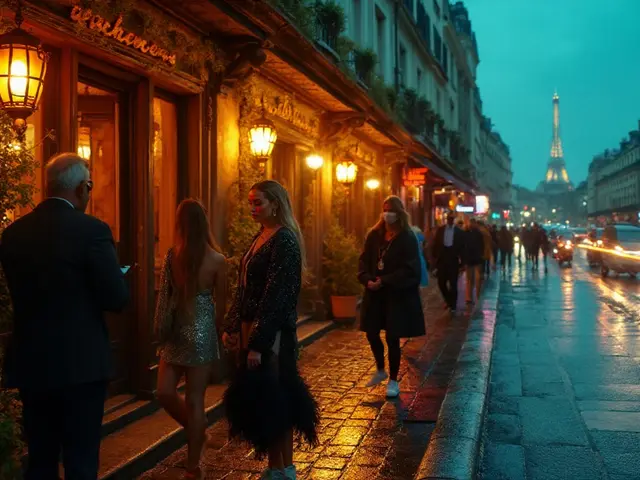If you think the only clubs worth checking out are the ones with velvet ropes and long lines, you’re missing out on what makes Paris nightlife truly special. Forget what you see on travel shows—locals rarely party where the crowds swarm. Want the real deal? It’s in those tucked-away clubs you hear about through a friend, the ones lit by neon and pumping out music that’s anything but mainstream. That’s where the real stories start—messy, loud, and absolutely unforgettable.
Key Points
- Local night clubs in Paris offer unique and authentic experiences far from the usual tourist traps.
- Hidden gems often feature local DJs, themed nights, and an eclectic crowd that loves to dance.
- Safety, smart budgeting, and understanding the local crowd can make your night smooth and memorable.
- Parisian club culture changes by neighborhood, with each offering its own flavor.
- Clubs in Paris usually have late hours, thriving from midnight to dawn.
Direct Answer
If you’re searching, “night club near me” in Paris and want a spot packed with local vibes, you’ll want to avoid the famous mega-clubs. Instead, look for bars and clubs popular with Parisians in neighborhoods like Belleville, Canal Saint-Martin, or Oberkampf. These venues are known for good music, approachable crowds, and authenticity—often open until sunrise. To find them, use apps like Mapstr, check local insta tags, or simply ask a bartender nearby for what’s buzzing that night.
Comprehensive Guide to Local Night Clubs Near You in Paris
You walk down a graffiti-tagged alley in the 11th arrondissement and drift toward the thump of bass vibrating under your feet. A bouncer with a wicked grin waves you past a barely-visible sign. The minute you step inside, you know—you’re nowhere near a tourist hotspot. Parisians love their secrets, especially when it comes to clubbing. Most of these clubs don’t advertise widely or show up at the top of TripAdvisor. You find out by word of mouth or spotting a cryptic post on someone’s story. Local clubs thrive on their loyal crowd: young creatives, students, night owls, and sometimes a few wide-eyed visitors who somehow got the inside scoop.
What makes a night club truly local? It’s not just the playlist, though that matters. It’s the mixed drinks that have a story, the walls covered in handwritten notes, and a DJ that spins rare house tracks until 4 am. Expect: themed nights (from 80s hip-hop to all-French funk), live bands starting up at 2 am, zero patience for bad vibes, but plenty of room for wild dancing. Some places double as art galleries or host underground comedy open-mic nights, keeping the crowd unpredictable.
Paris is split up into little kingdoms when it comes to nightlife: Oberkampf pulls in an indie crowd, Belleville tends to attract rebels and hipsters, La Villette’s warehouse spaces are where you’ll discover parties that officially “never happened.” The left bank has jazz arcades, while the Marais mixes pop with a vibrant LGBTQ+ scene. One night in a club on Canal Saint-Martin and you might end up dancing with a tattoo artist, a tech worker, and a philosophy student—all arguing about who gets to choose the next song.
People come for the music, but stay for the unpredictable magic—a secret gig, an electro-pop DJ you’ve never heard of, or just a perfectly-timed round of cheap tequila shots handed out at 3 am. That’s what keeps Paris’ local nightclubs full: real connection, raw energy, and an ever-refreshing sense of surprise. If you want a night out that feels both intimately Parisian and wildly new, this is where you start.
Definition and Context: What Makes a Night Club ‘Local’ in Paris?
“Local vibes” isn’t just about small crowds or cheap drinks. In Paris, it means the owners actually live nearby, the bartenders remember faces, and the regulars often end up as friends. While the city has its fair share of glitzy clubs, real local hotspots often hide behind nondescript doors, sometimes even disguised as coffee shops by day. The main marker? Parisians actually hang out there. The playlist changes based on the DJ or even the crowd’s requests, and nobody expects bottle service or dress codes beyond “no bad attitude.”
Think of local clubs as the city’s secret heartbeat. For example, La Java, a historic venue in Belleville, started as a ballroom in the 1920s and now hosts rap battles and electronic raves. Meanwhile, Djoon in southeastern Paris channels soulful house music, drawing regulars from all over the city. Popular street-level clubs in the Marais, like Les Bains or Le Duplex, fill up late, and once you’re in, you’re family—unless you mess with the mood. The difference from chain nightclubs or touristy rooftop bars? Each local club is a living, breathing part of its neighborhood.
The culture is fiercely protective of its regulars—the crowd is open but also expects respect for their unspoken rules. No entitled behavior, no phone zombies on the dance floor, and definitely no pretending to be a local if you can’t keep up with the rhythm. It’s friendly, but bring your best game. It’s always about the night, not about the scene. If you walk in with a smile and some curiosity, chances are you’ll walk out with new friends and wild stories for days.
Benefits of Hitting Up a Local Night Club in Paris
Here’s the thing about local clubs—they keep it real. Forget overpriced drinks and soulless playlists. Instead, expect craft cocktails mixed for you by the owner themselves or beers named after the neighborhood. You’ll find nights themed around everything from Afrobeat to Japanese city pop, stuffed into intimate spaces where everyone is invited to dance. It’s not unusual for local artists or musicians to perform sets between DJ breaks—which means you may catch the next breakout star before they hit the mainstream.
If you want to make friends or just feel less like a tourist, a local club is the quickest shortcut. Parisians love to talk music, share playlists, or debate anything from last night’s football match to the best boulangerie in the neighborhood. Crowds tend to be more relaxed—people come out to dance, not to pose or judge. And if you’re into cultural diversity, these clubs offer an amazing mix of backgrounds you won’t find elsewhere. Don’t be surprised if you end up staying out until the metro reopens in the morning, or you crash a birthday party at a nearby bakery at dawn.
Saving money is another plus. Cover charges are often lower than the big commercial spots, and the staff won’t pressure you for VIP service. Some offer late-night food or free water for dancers—little touches that make the experience feel like a community instead of a cash grab. Best of all, these clubs celebrate spontaneity. You don’t need to plan weeks ahead or reserve a table—just show up, see what’s playing, and let the night unfold.
Types of Local Night Clubs in Paris
Not all Parisian night clubs are the same. The vibe can change in a single city block. Let’s break it down so you know what you’re getting into:
- Dance Bars: Spots like Café Charbon or Le Truskel blend pub vibes with club nights. You can start with a beer, end up raving in a basement.
- Warehouse Parties: Look near La Villette or the city’s fringes for pop-up techno raves where nobody cares about your shoes.
- Music-focused Clubs: Djoon, Badaboum, and Le Rouge are famous for their DJs and themed dance nights, each drawing a loyal crew of music lovers.
- Secret Bars with Club Nights: Some cocktail bars (like Moonshiner or Lavomatic) shift into dance parties after midnight—a hidden door, a wink from the bartender, and suddenly you’re in another world.
- Alternative and LGBTQ+ Clubs: Places like Panic Room and Le Tango make inclusivity the main event, with wild themes and a come-as-you-are energy.
You’re not stuck with just one style. The beauty of Paris is how many options there are packed into tight corners. Each area has its own favorites—but wherever you end up, there’s one constant: nobody cares where you’re from. All that matters is how you bring your energy to the floor.

How to Find the Right Night Club Near You in Paris
Finding the “right” club can feel like an insider sport. Here’s a roadmap for scoring the real deal—no second-hand tips needed.
- Start with Google Maps, but don’t settle for what’s trending or has the most reviews. Look at recent photos, and check if the vibe looks crowded with tourists or chill with locals.
- Mapstr is a hot tip—locals use it to save and share their favorite clubs, tags even include the music type and crowd vibe.
- Instagram is your friend. Search geotags and stories late at night for a sneak peek of the actual crowd and real-time buzz.
- Ask around at a neighborhood bar. Bartenders always know what’s cool tonight—not just last year.
- Try Paris-specific party apps or forums. Meetup often lists underground events that fly under the radar.
Don’t get stuck in the same arrondissement. Paris nightlife is more about exploring than ticking off a list. Consult the metro map and plan to hit more than one spot if you can—sometimes the after-party is even better than the headliner event.
What to Expect: A Night Out in a Local Club
First things first: Nobody even thinks of showing up before midnight. Doors may open at ten, but prime time is between one and four in the morning. Don’t dress up like you’re meeting royalty. Jeans, sneakers, and a touch of personality in your look is all you need—just skip the flip-flops.
Expect a blend of musical styles, from Afrobeat and techno to 90s R&B. People actually dance here (no wallflowers), and it’s okay to request a song if you’re polite. Drinks are reasonably priced compared to uptown bars—figure on €7 to €12 for a cocktail. Special nights might mean discounted pitchers or a shot if you win a dance-off.
The crowd is fiercely social. You’ll get talking, whether in line for the restroom or fighting over whose backpack takes up less space at the bar. Smoking areas (sometimes rooftops or patios) become pop-up parties. Bathrooms can be hectic, but nobody lingers—too much excitement on the floor. Don’t be that person who spends the whole night recording stories—the vibe is to actually live in the moment, so your phone often stays in your pocket.
If you see a heavyset bouncer at the door, don’t sweat it—they’re usually keeping out trouble, not plotting a velvet-rope snub. Politeness and confidence go a long way. And yes, tipping is appreciated but never required.
Pricing, Booking, and Smart Budgeting
Most local clubs don’t require pre-booking. Just drop by, pay a cover charge (often €5-€15 depending on the night), and head in. A table reservation is rare unless you’re with a large group celebrating a birthday. Here’s an example of typical pricing across different types of Parisian clubs:
| Club Type | Cover Charge (€) | Drink Price (€) | Hours | Booking Needed? |
|---|---|---|---|---|
| Dance Bar | 5-10 | 6-10 | 6pm-4am | No |
| Music Club | 10-15 | 8-12 | 10pm-6am | Rarely |
| Warehouse Party | 15-25 | 10-15 | Midnight-7am | No |
Bring some cash, as not all places accept cards, especially at busy hours or the cash-only pop-up bars. Cloakroom fees can run €2-€4 if you want to check your coat or bag. Be prepared for lines—locals actually talk to each other while waiting, so it’s less a chore, more a warm-up.
Safety Tips for a Great Night Out
Nights in Paris are usually safe, especially inside local clubs where security is tight but not intrusive. Still, common sense beats drama:
- Watch your drink—never leave it unattended, even for a bathroom trip.
- Keep your phone zipped up. Pickpockets target distracted partiers.
- Hydrate! Even if the club feels cool, it heats up when packed.
- If you feel uncomfortable, talk to the staff—they know how to handle every situation.
- Plan your late-night ride ahead. Metro stops running around 1am during the week, 2am weekends, but night buses and rideshares are options.
- Don’t push your limits. Take breaks outside if you need air—the best conversations often happen on the curb anyway.
If you see anything sketchy, it’s okay to leave. Local clubs care about regulars and won’t tolerate troublemakers. As always, the golden rule is simple: be respectful, and the vibe will welcome you in.
Paris Night Clubs vs. Tourist Clubs: What’s the Real Difference?
| Local Night Club | Tourist Night Club |
|---|---|
| Mostly locals; drinks are affordable; real music variety; proudly casual vibe; friendly, spontaneous crowd | Mostly international visitors; expensive bottle service; mainstream playlists; dress code; can feel impersonal |
| Themed or surprise nights; DJs and live music; late open hours; relaxed entry | Pre-planned schedules; focus on quantity not quality; early closing times; strict bouncer policies |
| Neighborhood focus; club feels like part of the street’s fabric | Central location, big advertising, generic feel; more about ‘the scene’ |
FAQ: Night Clubs Near Me Full of Local Vibes
- What time do Paris local night clubs get busy? Most get lively after midnight, sometimes peaking at 2 am.
- Are local clubs safe for solo visitors? Yes, as long as you stick to known spots, watch your stuff, and trust your instincts.
- Do I need to speak French? It helps for making friends, but most Parisians understand basic English—smiles are universal.
- Can I get in with casual clothes? Absolutely, just avoid sports gear or anything too beachy.
- How late does public transport run? Metro runs until roughly 1am (weekdays) or 2am (weekends). Night buses and rideshares fill the gap.
Ready for a night out that’s pure Paris? Grab your gang or just your dancing shoes; these clubs are waiting—and you might just discover your new favorite place to call home after dark.



